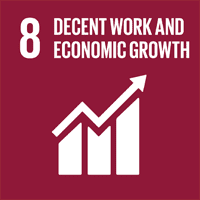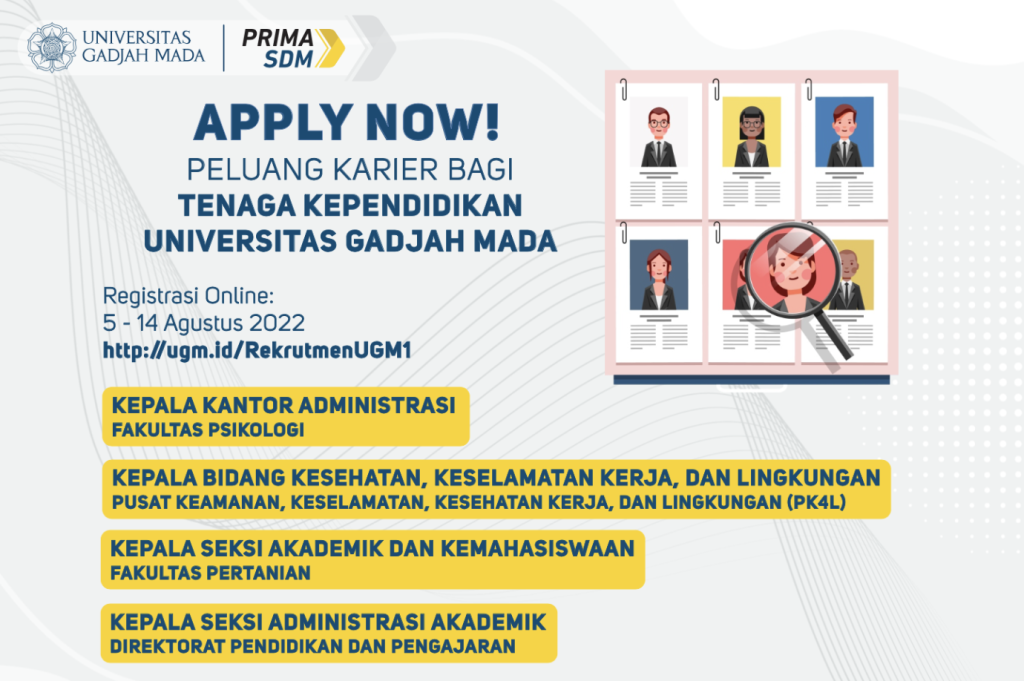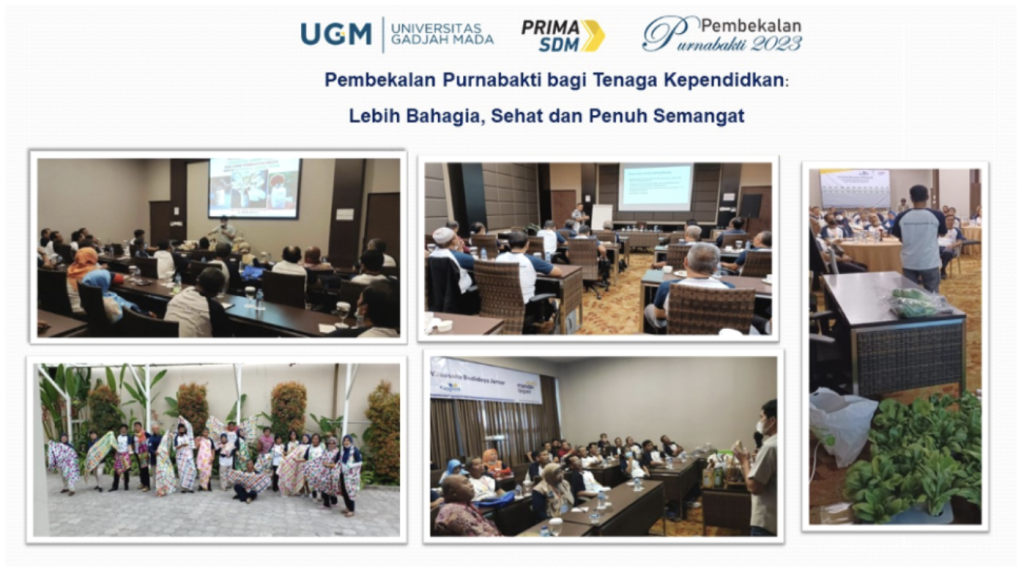
UGM SDG 8 REPORT:
PROMOTING SUSTAINABLE ECONOMIC GROWTH AND DECENT WORK FOR ALL
“FAIR PAY: BASIC LIVING WAGE FOR ALL FACULTY AND STAFF”
Universitas Gadjah Mada (UGM) is committed to ensuring fair pay and decent work for all faculty and staff. The university’s approach to compensation is guided by a combination of government regulations and internal policies. For civil servant staff, basic living wages are determined according to rank and period of work, as outlined in Government Regulation Number 15 Year 2019 on Salary Regulations for Civil Servants, which was recently amended by Presidential Regulation Number 10 Year 2024. For non-civil servant UGM staff, living wages are regulated in the Rector’s Decree Number 996/ UN1.P/KPT/DSDM/2019, which decrees that basic salaries for permanent lecturers and permanent teaching staff are determined according to the Attachments of Government Regulation Number 15 of 2019.
In addition to basic living wages, UGM awards performance-based incentives to staff, as regulated in Rector’s Regulation Number 4 Year 2018. The IBK System, which is accompanied by a regulated scoring and electronic information system, awards incentives based on employees’ success in demonstrating discipline, achieving outstanding performance, and meeting predetermined strategic goals. The IBK system applies to both Lecturers and Teaching Staff, including civil servants, candidate civil servants, permanent staff, and staff with work agreements. UGM lecturers also receive additional incentives based on workload and employee ranks, including incentives for teaching, thesis supervisory, undertaking community service/outreach programs, and other academic achievements.
“UGM EMBRACES EMPLOYEE UNIONS TO CHAMPION LABOUR RIGHTS”
UGM recognizes the importance of employee unions in advocating for labor rights and ensuring fair treatment for all staff. The university has established the KORPAGAMA employee corps, which was formed by, from, and for the employees of Universitas Gadjah Mada. KORPAGAMA has the freedom and responsibility to discuss its own bylaws, program plans, and management. The university also recognizes the Faculty of Social and Political Sciences (FISIPOL) Labor Union, known as SPF, which was established to address issues of welfare and workload inequality affecting lecturers, educational staff, and assistants.
“BUILDING EQUALITY AND INCLUSION: UGM POLICIES TO END DISCRIMINATION IN THE WORKPLACE”
UGM maintains that the workplace on campus must be free of discrimination, regardless of the person’s gender, ethnicity, religion, race, and class. The university’s policy on ending discrimination in the workplace is mandated in the Board of Trustees Regulation Number 1 Year 2023, which states that UGM guarantees a safe and comfortable campus ecosystem, free from sexual violence, bullying, mental health problems, discrimination, and friendly to people with disabilities. This regulation builds upon the Board of Trustees Regulation Number 1 Year 2020, which mandated an inclusive campus development based on anti-discrimination. UGM is especially adamant that all women on campus, both staff and students, are to be treated equally. Their rights are guaranteed based on the Board of Trustees Regulation Number 1 Year 2021, which states that UGM is fighting for universal principles, namely social justice, equality, inclusivism, and sustainability in all aspects of university administration policies.
UGM places significant emphasis on policies that promote fairness and pay special attention to nondiscrimination. Rector’s Regulation Number 11 Year 2023 outlines that Human Resource Management must adhere to principles of professionalism, transparency, accountability, participation, fairness and equality, non-discrimination, quality assurance, and information technology-based practices. This policy aimed to strengthen non-discrimination in human resources management, which is also noted in Rector’s Regulation Number 18 Year 2016 concerning Human Resources Management.
UGM is committed to upholding standards of human values and dignity, as well as protect the entire campus community from all forms of sexual violence. This commitment is reflected in Rector’s Regulation Number 1 Year 2020 and Rector’s Regulation Number 1 Year 2023, which specifically regulate sexual violence.
“SAFEGUARDING RIGHTS: POLICIES PROHIBITING CHILD AND FORCED LABOUR”
UGM is highly against any form of child labor. Rector’s Regulation Number 18 Year 2016 contains the requirements that must be fulfilled for UGM employees, including a minimum age requirement of 18 years old. There are specific recruitment requirements for UGM permanent lecturers and administrative staff that help ensure future employees meet the minimum age requirements. To ensure that no form of forced labor or modern slavery is ever present on campus, UGM strictly regulates additional time/overtime for staff working after working hours. Salary for staff working after working hours is determined in the University’s Policy on General Financial Standard 2024.
“ENSURING EQUITABLE TREATMENT FOR OUTSOURCED WORKERS: UGM’S COMMITMENT TO INCLUSIVITY”
UGM also relies on outsourced workers to maintain campus facilities, support academic functions, and provide essential services. The university has implemented policies to ensure that the rights of outsourced workers are protected and follow the determined rates given by the Indonesian government. Rector’s Regulation Number 12 Year 2022 concerning the Procurement of Goods and Services outlines the salary standards for external parties. Rector’s Circular Letter Number 1069/UN1.P.IV/P2L/TR/2021 regulates the standard rates for outsourced individuals, including their minimum/maximum wages per month. The UGM Procurement Office is in charge of the Guidelines for Implementing Procurement of Outsourced Workers based on these regulations.
“EQUAL PAY AT UGM AND THE ELIMINATION OF GENDER PAY GAPS”
UGM upholds a policy of equal pay, with no gender-based differences in salaries. The university’s wage scale policy is based exclusively on a standardized salary table that considers employment status and length of service, regardless of gender. Basic salaries for all staff vary only by position, according to Government Regulation Number 15 Year 2019 and Rector’s Decree Number 996/ UN1.P/KPT/DSDM/2019. In 2024, there will be a salary adjustment for UGM employees following the revisions in Presidential Regulation Number 10 Year 2024. There are also no gender pay gaps in the performance-based incentives that UGM awards to staff, as mandated in Rector Regulation Number 4 Year 2018.
“UGM’S APPROACH TO MEASURING PAY SCALE FAIRNESS”
UGM has developed an electronic financial system (finance.simaster.ugm.ac.id) that is used as a platform for all payments and financial transfers, including salaries. The Simaster Finance Salary System can be used as a tracking system to ensure proper and equal pay to all staff, regardless of gender. The system follows the determined basic salaries and wages regulated in Government Regulation Number 15 Year 2019 and Rector’s Decree Number 996/ UN1.P/KPT/DSDM/2019, with updates from Presidential Regulation Number 10 Year 2024. Performance-based incentives are regulated in Rector Regulation Number 4 Year 2018.
“EMPLOYEE EMPOWERMENT AT UGM: THE RIGHT TO APPEAL ON RIGHTS AND/OR PAY”
UGM employees are able to appeal regarding their rights and/or pay through UGM’s public aspiration system available on the Integrated Service Portal. Employees can submit their appeals through the website or phone. Since 2024, UGM has also updated its Whistleblowing System (WBS) for Reporting Violations, providing a reporting channel for the entire UGM academic community to report any violations. Employee aspirations and rights, including those pertaining to salaries and/or pay, are protected by established UGM policies, such as the Rector’s Regulation Number 514 Year 2015 and Rector’s Regulation Number 13 Year 2016 on the UGM Honorary Council.
“UPHOLDING LABOUR RIGHTS: BUILDING A FOUNDATION FOR INCLUSION, TRAINING, AND EMPLOYEE WELL-BEING”
Recognizing and upholding the labor rights of UGM employees, including the freedom of association and the right to collective bargaining, is essential for fostering an equitable and inclusive work environment on campus. UGM ensures that these rights extend to all employees, embracing both women and international staff.
Open System for Job Promotion: Opportunities for UGM employee career growth must be transparent and accessible to all individuals. This includes the promotion of academic staff (lecturers) and administrative staff, as well as open selection for structural positions at UGM and for Field Coordinator roles at the Faculty of Engineering.
Employee Training Programs: UGM offers training programs to all staff, including women and international staff, to empower its workforce and strengthen skills, equity, and collaboration. These programs include Pre-Retirement Training, which provides guidance on mental readiness, health, and financial management, and emergency response training.
Programs for the Well-Being of Employees: UGM provides BPJS Employment insurance scheme to its employees, strengthening its commitment to promoting a healthy and prosperous life for its employees.
Through its comprehensive initiatives, UGM demonstrates its commitment to achieving SDG 8: Promote sustained, inclusive and sustainable economic growth, full and productive employment and decent work for all. The university’s efforts to ensure fair pay, uphold labor rights, and promote employee well-being illustrate its dedication to creating a just and equitable work environment for all.

Open System Job Promotion for Employee Career Growth

Employee Pre-Retirement Training
Overall Report for SDG 1 to 17
UGM annually reports its achievements in implementing “Tri Dharma” and its contribution to society through Dies Natalis UGM, which is conducted at the end of each year by inviting all academic staff and students as well as the university’s partners. UGM also publishes a Sustainable Development Report annually.
- UGM’s SDGs Report 2023
